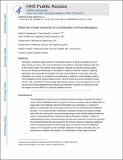Roles for Innate Immunity in Combination Immunotherapies
Author(s)
Moynihan, Kelly Dare; Irvine, Darrell J
Downloadnihms911205.pdf (481.3Kb)
OPEN_ACCESS_POLICY
Open Access Policy
Creative Commons Attribution-Noncommercial-Share Alike
Terms of use
Metadata
Show full item recordAbstract
Immunity to infectious agents involves a coordinated response of innate and adaptive immune cells working in concert, with many feed-forward and regulatory interactions between both arms of the immune system. In contrast, many therapeutic strategies to augment immunity against tumors have focused predominantly on stimulation of adaptive immunity. However, a growing appreciation of the potential contributions of innate immune effectors to antitumor immunity, especially in the context of combination immunotherapy, is leading to novel strategies to elicit a more integrated immune response against cancer. Here we review antitumor activities of innate immune cells, mechanisms of their synergy with adaptive immune responses against tumors, and discuss recent studies highlighting the potential of combination therapies recruiting both innate and adaptive immune effectors to eradicate established tumors.
Date issued
2017-10Department
Massachusetts Institute of Technology. Center for Materials Science and Engineering; Massachusetts Institute of Technology. Department of Biological Engineering; Massachusetts Institute of Technology. Department of Materials Science and Engineering; Ragon Institute of MGH, MIT and Harvard; Koch Institute for Integrative Cancer Research at MITJournal
Cancer Research
Publisher
American Association for Cancer Research (AACR)
Citation
Moynihan, Kelly D., and Darrell J. Irvine. “Roles for Innate Immunity in Combination Immunotherapies.” Cancer Research, vol. 77, no. 19, Oct. 2017, pp. 5215–21.
Version: Author's final manuscript
ISSN
0008-5472
1538-7445